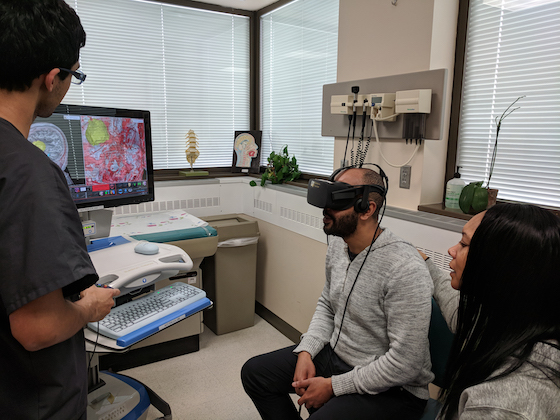Advanced Technology for Patient Care
September 13, 2021
GW Hospital is committed to providing patients with the best possible care. As an academic hospital, we continue to invest in new, advanced technology throughout our facilities and services. Here are some highlights of what we’ve added so far in 2021:
Virtual Reality for Planning Colorectal Surgery
 GW Hospital has been using precision virtual reality for planning neurosurgery cases since 2017, and we were the first in the nation to use VR for thoracic cases. Now, GW uses VR for colorectal surgery planning as well.
GW Hospital has been using precision virtual reality for planning neurosurgery cases since 2017, and we were the first in the nation to use VR for thoracic cases. Now, GW uses VR for colorectal surgery planning as well.
VR technology creates a 360-degree reconstruction of a patient’s anatomy, enabling surgeons to plan and virtually walk patients through the procedure before surgery takes place. Once patients put the VR goggles on, they describe it as “flying” through their own body. This helps patients better understand the most complex conditions and assists surgeons in mapping out surgical plans.
In addition to VR, we perform transanal minimally invasive surgery (TAMIS) to remove very early-stage rectal cancers and large rectal polyps that cannot be removed by endoscopy.
Learn more about VR technology →
ROSA Robot Leads the Way in Knee Surgery
GW Hospital is the first facility in D.C. to obtain the robotic-assisted ROSA® Knee System. This exciting, advanced technology is designed to enhance your comfort and overall experience with total knee replacement. To personalize knee replacement to your unique anatomy, the ROSA robot collects data before and during surgery to help the surgeon guide implant placement with precision. This allows for smaller incisions and may lead to a quicker recovery.
Don’t let knee or other orthopedic injuries slow you down. Our experienced surgeons can get you back to doing what you love.
Learn more about the ROSA Robot →
BAROSTIM NEO™ Implants for Advanced Heart Failure Surgery
GW Hospital was the first in the region to offer BAROSTIM NEO implants for advanced heart failure. These implants are unique because they use neuromodulation – the power of the brain and nervous system – to improve the symptoms of patients with systolic heart failure.
Unlike other heart failure treatment options, BAROSTIM does not touch the heart and instead utilizes an electrode that lies on the patient’s carotid artery. Over time, the organ will regain strength, with the symptoms of heart failure lessening, enabling patients to return to normal activity. This results in improved quality of life.
This advanced technology can:
- Relax blood vessels to improve blood flow, reducing the pressure on the heart
- Regulate the heart rate to help keep the heart working well
- Improve kidney function to reduce body fluid, which helps reduce swelling and congestion in the heart
Learn more about our advanced heart failure services →
Aquablation to Treat Enlarged Prostates
Benign Prostatic Hyperplasia (BPH), or enlarged prostate, is one of the most common conditions occurring in men over the age of 40. Symptoms may include decreased urinary flow, frequency, and urgency, as well as the need to wake frequently during the night to urinate.
GW Hospital offers aquablation therapy, a new, robotic-assisted treatment. Aquablation uses imaging and high-pressured water to relieve the lower urinary tract symptoms that result from enlarged prostate. This minimally invasive procedure helps removed enlarged tissue with a lower risk of complications than other, more traditional methods.
Learn more about treatment for enlarged prostate →
Stay Tuned for More New Technology
GW Hospital is continuously investing in technology to move the needle forward in patient care.
*Individual results may vary. There are risks associated with any surgical procedure. Talk with your doctor about these risks to find out if minimally invasive or robotic-assisted surgery is right for you.
